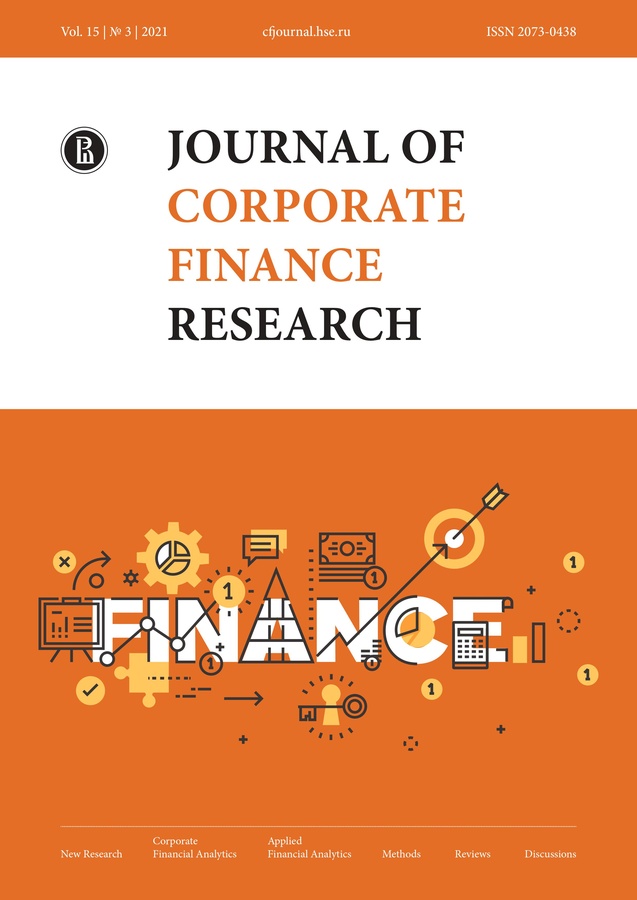Cash Management in Russian Metallurgical and Oil and Gas Companies
- Авторы: Likhacheva O.1, Panasenko K.1
-
Учреждения:
- HSE
- Выпуск: Том 15, № 3 (2021)
- Страницы: 60-69
- Раздел: Новые исследования
- URL: https://bakhtiniada.ru/2073-0438/article/view/303417
- DOI: https://doi.org/10.17323/j.jcfr.2073-0438.15.3.2021.60-69
- ID: 303417
Цитировать
Полный текст
Аннотация
The problem of money management has remained relevant over the past years. The aim of the study is to assess the impact of debt and cash flow on the amount of cash on companies with and without financial constraints. The main hypothesis of the study is that the impact of debt and cash flow on the level of cash depends on financial constraints which were taken as two proxy variables – dividend payment and bond rating. To substantiate the hypothesis put forward, a regression model of the influence of debt and cash flow on the level of cash is built in the work.
For the analysis, large Russian companies in the metallurgical and oil and gas industries were sorted in accordance with financial constraints. Based on the results of the constructed regression model, the following conclusions can be drawn. Borrowed funds of companies negatively affect the amount of cash on the balance sheet, regardless of the presence and type of financial constraints. Cash flow is not statistically significant for companies without financial constraints.
This study has some limitations. The research results can be useful for corporate CFOs in order to optimize cash balances.
Ключевые слова
Об авторах
O. Likhacheva
HSE
Автор, ответственный за переписку.
Email: OLihacheva@fa.ru
K. Panasenko
Email: panasenkoko@mos.ru
Список литературы
- Megginson W.L., Smart S.B. Introduction to Corporate Finance. Mason, OH: Thomson/South‑Western; 2006. 965 p.
- Keynes J.M. The General Theory of Employment, Interest, and Money. London: Macmillan; 1936. 403 p.
- Kim C.S., Mauer D.C., Sherman A.E. The determinants of corporate liquidity: Theory and evidence. Journal of Financial and Quantitative Analysis. 1998;33(3):335–359. DOI: 10.2307/2331099
- Jensen M.C. Agency cost of free cash flow, corporate finance, and takeovers. The American Economic Review. 1986;76(2):323–329.
- Baumol W.J. The transactions demand for cash: An inventory theoretic approach. Quarterly Journal of Economics. 1952;66(4):545–556.
- Tobin J. The interest‑elasticity of transactions demand for cash. The Review of Economics and Statistics. 1956;38(3):241–247. DOI: 10.2307/1925776
- Miller M.H., Orr D. A model of the demand for money by firms. The Quarterly Journal of Economics. 1966;80(3):413–435. DOI: 10.2307/1880728
- John T.A. Accounting measures of corporate liquidity, leverage, and costs of financial distress. Financial Management. 1993;22(3):91–100. DOI: 10.2307/3665930
- Beltz J., Murray F. Risk and corporate holdings of highly liquid assets. Unpublished Working Paper. University of British Columbia; 1996. Available from: http://citeseerx.ist.psu.edu/viewdoc/download?doi=10.1.1.198.3645&rep=rep1&type=pdf
- Opler T., Pinkowitz L., Stulz R., Williamson R. The determinants and implications of corporate cash holdings. Journal of Financial Economics. 1999;52(1):3–46. DOI: 10.1016/S0304‑405X(99)00003‑3
- Park J. Financial constraints and the cash flow sensitivities of external financing: Evidence from Korea. Research in International Business and Finance. 2019;49:241–250. DOI: 10.1016/j.ribaf.2019.03.007
- Myers S.C., Majluf N.S. Corporate financing and investment decisions when firms have information that investors do not have. Journal of Financial Economics. 1984;13(2):187–221. DOI: 10.1016/0304‑405X(84)90023‑0
- Shyam‑Sunder L., Myers S.C. Testing static trade‑off against pecking order models of capital structure. Journal of Financial Economics. 1999;51(2):219–244. DOI: 10.1016/S0304‑405X(98)00051‑8
- Musnadi S., Syamni G., Nasir F., Saputra J. Investigating the cash holding factors of mining industries in Indonesia Stock Exchange. Industrial Engineering & Management Systems. 2020;19(3):527–537. DOI: 10.7232/iems.2020.19.3.527
- Bates T.W., Kahle K.M., Stulz R.M. Why do US firms hold so much more cash than they used to? The Journal of Finance. 2009;64(5):1985–2021. DOI: 10.1111/j.1540‑6261.2009.01492.x
- Almeida H., Campello M., Weisbach M.S. The cash flow sensitivity of cash. The Journal of Finance. 2004;59(4):1777–1804. DOI: 10.1111/j.1540‑6261.2004.00679.x
- Acharya V.V., Almeida H., Campello M. Is cash negative debt? A hedging perspective on corporate financial policies. Journal of Financial Intermediation. 2007;16(4):515–554. DOI: 10.1016/j.jfi.2007.04.001
- Fazzari S.M., Hubbard R.G., Petersen B. Financing constraints and corporate investment. Brookings Papers on Economic Activity. 1998;(1):141–206. DOI: 10.2307/2534426
- Sarkar S., Zhang C. Investment and financing decisions with learning‑curve technology. Journal of Banking & Finance. 2020;121:105967. DOI: 10.1016/j.jbankfin.2020.105967
- D’Mello R., Krishnaswami S., Larkin P.J. Determinants of corporate cash holdings: Evidence from spin‑offs. Journal of Banking and Finance. 2008;32(7):1209–1220. DOI: 10.1016/j.jbankfin.2007.10.005
- Upneja A., Dalbor M.C. The choice of long‑term debt in the U.S. lodging industry; 2001. Available from: https://www.researchgate.net/publication/271754008_The_Choice_of_Long-Term_Debt_in_the_Hotel_Industry
- Tang C., Jang S. Revisit to the determinants of capital structure: A comparison between lodging firms and software firms. International Journal of Hospitality Management. 2007;26(1):175–187. DOI: 10.1016/j.ijhm.2005.08.002
Дополнительные файлы











